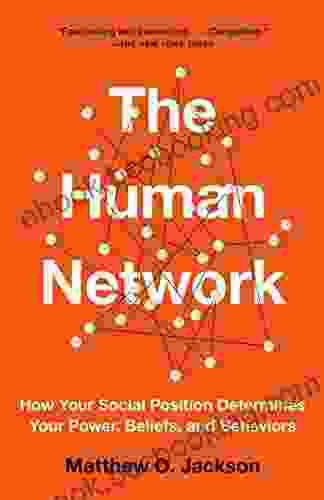How Your Social Position Determines Your Power Beliefs And Behaviors

The tapestry of human society is interwoven with a myriad of social positions, each carrying its own unique set of expectations, privileges, and constraints. From the lofty heights of leadership to the humble depths of servitude, the position we occupy in society exerts a profound influence on our beliefs, values, and behaviors, particularly in relation to power.
4.5 out of 5
| Language | : | English |
| File size | : | 20094 KB |
| Text-to-Speech | : | Enabled |
| Screen Reader | : | Supported |
| Enhanced typesetting | : | Enabled |
| X-Ray | : | Enabled |
| Word Wise | : | Enabled |
| Print length | : | 346 pages |
| Item Weight | : | 1.57 pounds |
This article will delve into the captivating correlation between social position, power beliefs, and behavior, exploring the intricate ways in which our place in the social hierarchy shapes our perceptions of power and guides our actions. Through an in-depth examination of psychological research, sociological theories, and real-world examples, we will uncover the profound impact of social position on our understanding of power and its deployment.
The Nexus of Social Position and Power Beliefs
Social position serves as a prism through which individuals perceive and interpret the world around them, including the concept of power. As we navigate our social milieu, we absorb and internalize the beliefs, attitudes, and values associated with our particular position. These internalized beliefs form the foundation of our power beliefs, which exert significant influence over our thoughts, feelings, and actions.
For instance, individuals occupying positions of high status and authority often develop a strong sense of entitlement and self-efficacy, believing they are inherently worthy of power and capable of wielding it effectively. Conversely, those in lower-status positions may internalize a sense of powerlessness and self-doubt, believing they are unworthy of power or incapable of exercising it.
The Influence of Power Beliefs on Behavior
Power beliefs, in turn, have a direct bearing on our behavior. Individuals who believe they possess power are more likely to engage in assertive, dominant behaviors, such as initiating conversations, taking charge of situations, and influencing others. They may also exhibit a greater willingness to take risks and challenge the status quo.
On the other hand, individuals who believe they lack power tend to exhibit more submissive, deferential behaviors, such as avoiding conflict, deferring to others, and accepting their fate without protest. They may also be less likely to speak up for themselves or pursue their own goals.
The Impact of Social Hierarchy on Power Dynamics
The relationship between social position, power beliefs, and behavior is further amplified by the existence of social hierarchies. Social hierarchies are structured systems of inequality that rank individuals and groups based on factors such as wealth, status, prestige, and power. Within these hierarchies, individuals at different levels experience power imbalances and have varying degrees of influence over others.
The higher an individual's position in a hierarchy, the greater their access to power and resources. This, in turn, reinforces their sense of entitlement and self-efficacy, perpetuating a cycle of power accumulation. Conversely, individuals at the lower rungs of the hierarchy have less access to power and resources, which can lead to a sense of powerlessness and self-doubt, further entrenching them in their subordinate position.
Case Studies of Social Position and Power Dynamics
Numerous real-world examples illustrate the profound impact of social position on power beliefs and behavior. In the corporate world, for instance, executives and managers often exhibit a strong sense of power and authority, making decisions that affect the lives of their subordinates. In contrast, entry-level employees and interns may feel less powerful and may defer to their superiors without question.
In the political arena, elected officials wield significant power over their constituents, shaping policies and making decisions that impact entire communities. Yet, citizens who lack political power may feel powerless to influence the decisions that affect their lives.
Implications for Society and Individuals
The correlation between social position, power beliefs, and behavior has profound implications for both society and individuals. It can perpetuate inequality, create social divisions, and stifle individual growth and potential. However, it can also provide opportunities for change and empowerment.
For individuals, understanding the link between social position and power beliefs can empower them to challenge oppressive power structures and work towards creating a more just and equitable society. By recognizing the influence of their social position on their own power beliefs, individuals can develop strategies to overcome self-limiting beliefs and cultivate a sense of empowerment.
For society as a whole, addressing the inequities inherent in social hierarchies is essential for creating a more harmonious and just world. This can involve implementing policies that promote social mobility, reducing income inequality, and dismantling systems of oppression. By creating opportunities for all individuals to access power and resources, we can unlock the full potential of our societies and empower everyone to participate fully in shaping their own destinies and the future of the world.
The correlation between social position, power beliefs, and behavior is a complex and multifaceted phenomenon that has a profound impact on our thoughts, feelings, and actions. By understanding the ways in which our social position shapes our power beliefs and guides our behavior, we can gain valuable insights into the functioning of society and our own experiences within it. This knowledge can empower us to challenge oppressive power structures, cultivate a sense of empowerment, and work towards creating a more just and equitable world.
4.5 out of 5
| Language | : | English |
| File size | : | 20094 KB |
| Text-to-Speech | : | Enabled |
| Screen Reader | : | Supported |
| Enhanced typesetting | : | Enabled |
| X-Ray | : | Enabled |
| Word Wise | : | Enabled |
| Print length | : | 346 pages |
| Item Weight | : | 1.57 pounds |
Do you want to contribute by writing guest posts on this blog?
Please contact us and send us a resume of previous articles that you have written.
 Book
Book Novel
Novel Page
Page Chapter
Chapter Text
Text Story
Story Genre
Genre Reader
Reader Library
Library Paperback
Paperback E-book
E-book Magazine
Magazine Newspaper
Newspaper Paragraph
Paragraph Sentence
Sentence Bookmark
Bookmark Shelf
Shelf Glossary
Glossary Bibliography
Bibliography Foreword
Foreword Preface
Preface Synopsis
Synopsis Annotation
Annotation Footnote
Footnote Manuscript
Manuscript Scroll
Scroll Codex
Codex Tome
Tome Bestseller
Bestseller Classics
Classics Library card
Library card Narrative
Narrative Biography
Biography Autobiography
Autobiography Memoir
Memoir Reference
Reference Encyclopedia
Encyclopedia Stephen Voltz
Stephen Voltz Randall Bell
Randall Bell Stephanie Jeanette Bradley
Stephanie Jeanette Bradley Patricia L Thompson
Patricia L Thompson Marty Crisp
Marty Crisp Marc Stickdorn
Marc Stickdorn Misty Black
Misty Black Kyle Keegan
Kyle Keegan Louise Davidson
Louise Davidson Srini Sekaran
Srini Sekaran Tony Alessandra
Tony Alessandra Lauren Smith Brody
Lauren Smith Brody Paul Eng
Paul Eng Lynda Lopez
Lynda Lopez Trevor Herriot
Trevor Herriot Sara Deseran
Sara Deseran Margo Lee Williams
Margo Lee Williams Luis Valdez
Luis Valdez Patrick Symmes
Patrick Symmes Sally Springer
Sally Springer
Light bulbAdvertise smarter! Our strategic ad space ensures maximum exposure. Reserve your spot today!
 Cade SimmonsFollow ·14.9k
Cade SimmonsFollow ·14.9k Anthony WellsFollow ·15.9k
Anthony WellsFollow ·15.9k Nathaniel PowellFollow ·12.3k
Nathaniel PowellFollow ·12.3k Larry ReedFollow ·4.8k
Larry ReedFollow ·4.8k Eddie BellFollow ·4.5k
Eddie BellFollow ·4.5k Devin CoxFollow ·10.5k
Devin CoxFollow ·10.5k Johnny TurnerFollow ·5.8k
Johnny TurnerFollow ·5.8k John SteinbeckFollow ·15.1k
John SteinbeckFollow ·15.1k

 Philip Bell
Philip BellPersonal History: From the Last Imperial Dynasty to the...
By Author Name A...

 Gustavo Cox
Gustavo CoxAlexander Csoma de Kőrös: The Father of Tibetology
Alexander...

 Harvey Bell
Harvey BellUnveiling the Titanicat: Dive into the True Stories...
A Literary Voyage into the...

 José Martí
José MartíUnveiling the Festive Flavors of Christmas: A Culinary...
As the crisp winter air fills with the...
4.5 out of 5
| Language | : | English |
| File size | : | 20094 KB |
| Text-to-Speech | : | Enabled |
| Screen Reader | : | Supported |
| Enhanced typesetting | : | Enabled |
| X-Ray | : | Enabled |
| Word Wise | : | Enabled |
| Print length | : | 346 pages |
| Item Weight | : | 1.57 pounds |















